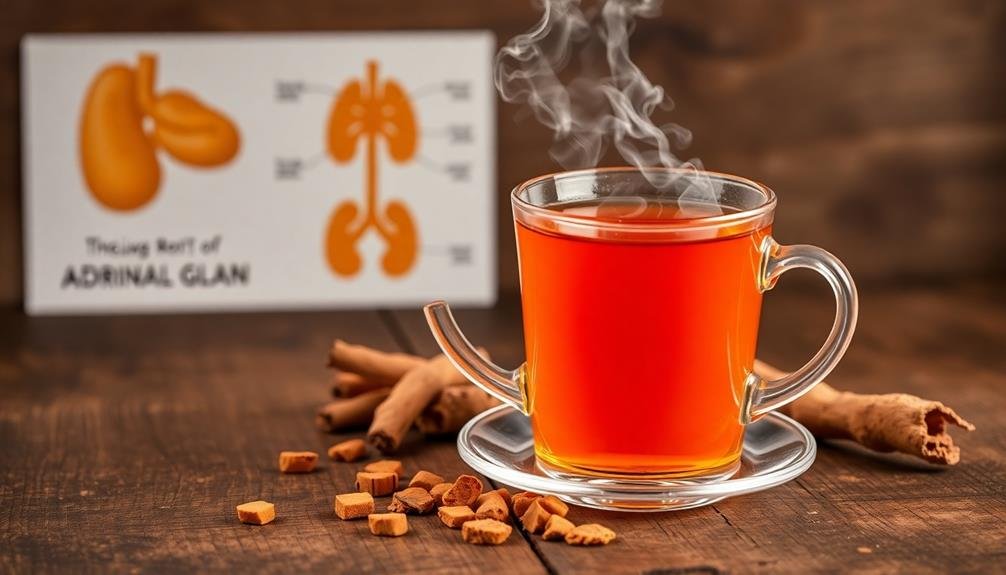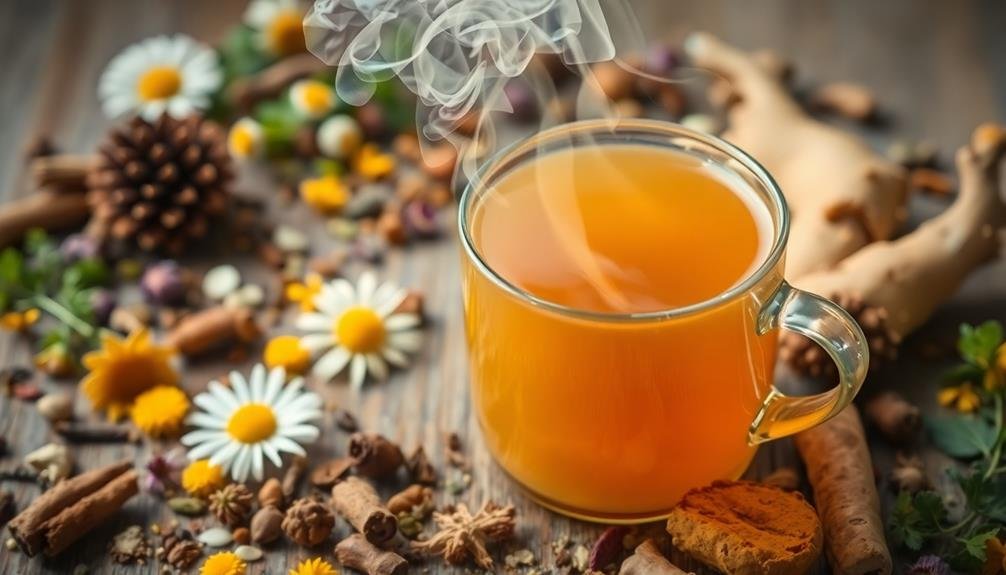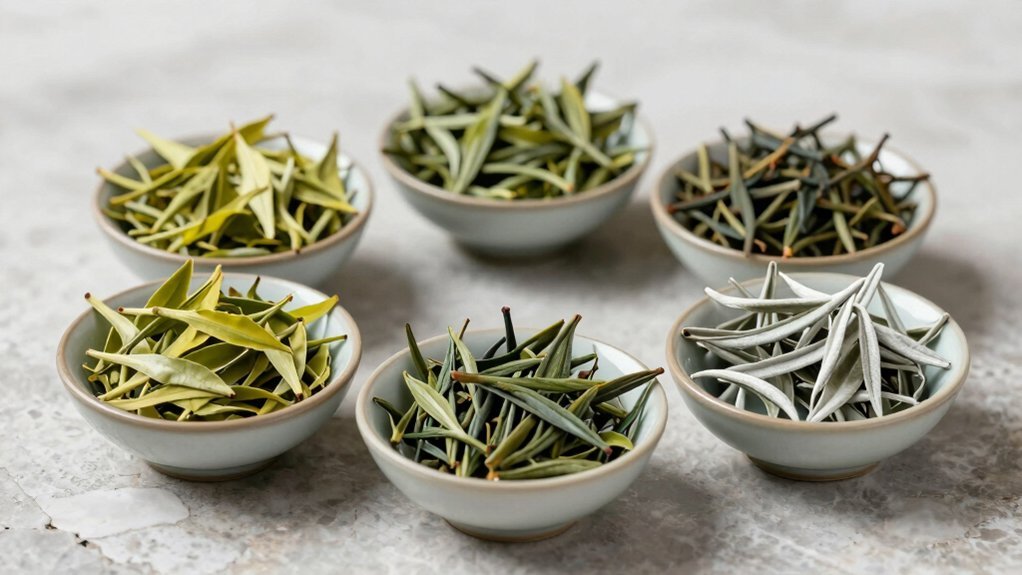Herbal teas can provide natural relief for autoimmune disorders while supporting your immune system. Popular options include echinacea for immune-boosting, turmeric for its anti-inflammatory properties, and ginger to soothe digestion. Green tea offers antioxidants, while licorice root supports adrenal function. Ashwagandha can help reduce stress and regulate cortisol levels. When preparing these teas, use high-quality organic herbs and follow recommended dosages. Always consult your healthcare provider before adding new herbal remedies to your routine, especially if you're taking medications. By understanding the benefits of each herb, you'll be better equipped to create effective tea blends tailored to your needs.
Understanding Autoimmune Disorders

Autoimmune disorders are complex medical conditions that occur when your body's immune system mistakenly attacks healthy cells. These disorders can affect various parts of your body, including your skin, joints, organs, and tissues. Common examples include rheumatoid arthritis, lupus, multiple sclerosis, and Type 1 diabetes.
When you have an autoimmune disorder, your immune system can't distinguish between harmful invaders and your own cells. This confusion leads to the production of autoantibodies, which attack healthy tissues. The exact cause of autoimmune disorders isn't fully understood, but factors like genetics, environmental triggers, and infections may play a role.
Symptoms of autoimmune disorders vary widely depending on the specific condition and affected areas. You might experience fatigue, joint pain, skin problems, or digestive issues.
Diagnosis often involves blood tests, imaging studies, and physical examinations. Treatment typically aims to reduce inflammation, manage symptoms, and suppress the overactive immune response. This may include medications like immunosuppressants, anti-inflammatory drugs, and lifestyle changes.
While there's no cure for most autoimmune disorders, proper management can help you maintain a good quality of life. It's essential to work closely with your healthcare provider to develop an effective treatment plan tailored to your specific needs.
Benefits of Herbal Teas
While managing autoimmune disorders often involves medical treatments, you can also support your immune system through natural means. Herbal teas offer a gentle, effective way to boost your immune function and alleviate symptoms associated with autoimmune conditions. These teas are packed with antioxidants, anti-inflammatory compounds, and essential nutrients that can help regulate your immune response.
Drinking herbal teas can reduce inflammation, a key factor in many autoimmune disorders. They're also known to enhance your body's ability to fight off infections, which is vital when your immune system is compromised.
Some teas, like green tea and chamomile, have been shown to reduce stress and promote relaxation, potentially easing the impact of stress on your immune system.
Certain herbal teas can improve digestion and gut health, which is closely linked to immune function. They may also help detoxify your body, supporting your liver and kidneys in eliminating harmful substances.
Additionally, many herbal teas provide hydration without added sugars or artificial ingredients, making them a healthy alternative to other beverages. By incorporating immune-boosting herbal teas into your daily routine, you're taking a proactive step towards managing your autoimmune disorder naturally.
Echinacea: Nature's Immune Booster

Resilience characterizes Echinacea, a powerful herb renowned for its immune-boosting properties. This purple coneflower has been used for centuries to support the body's natural defenses. When brewed as a tea, Echinacea can help stimulate your immune system, potentially reducing the severity and duration of common colds and flu.
You'll find that Echinacea tea offers a range of benefits. It's rich in antioxidants, which combat free radicals and reduce inflammation in your body. The herb also contains alkamides, compounds that interact with your immune system to enhance its function.
Regular consumption may help increase the production of white blood cells, your body's frontline defenders against pathogens.
To make Echinacea tea, steep dried flowers, leaves, and roots in hot water for about 10 minutes. You can drink it daily during cold and flu season to fortify your immune system. However, it's best to take breaks every few weeks to maintain its effectiveness.
While generally safe, consult your doctor before using Echinacea if you have autoimmune disorders, as its immune-stimulating effects might interact with your condition or medications.
Turmeric: Anti-Inflammatory Powerhouse
Turmeric, a vibrant yellow spice, contains curcumin, a compound renowned for its potent anti-inflammatory properties.
You'll find that curcumin can help reduce inflammation throughout your body, potentially boosting your immune system and overall health.
To harness these benefits, you can easily brew turmeric tea at home by steeping fresh or dried turmeric root in hot water.
Curcumin's Anti-Inflammatory Properties
Curcumin, the active compound in turmeric, stands out as a potent anti-inflammatory agent. It's been extensively studied for its ability to combat inflammation at the molecular level. When you consume curcumin, you're tapping into a natural remedy that's been used for centuries in traditional medicine.
The anti-inflammatory properties of curcumin work through multiple mechanisms:
- It inhibits the production of inflammatory molecules like cytokines and prostaglandins.
- Curcumin blocks the activation of NF-κB, a key protein complex involved in inflammation.
- It reduces the activity of enzymes that contribute to inflammation, such as COX-2 and LOX.
These actions make curcumin particularly beneficial for those with autoimmune disorders, where chronic inflammation is a common issue.
By incorporating turmeric tea into your daily routine, you're providing your body with a powerful tool to fight inflammation.
However, it's essential to recognize that curcumin's bioavailability is low, so you might want to combine it with black pepper or consume it with healthy fats to enhance absorption.
Always consult with your healthcare provider before adding new supplements to your regimen, especially if you're managing an autoimmune condition.
Brewing Turmeric Tea
Crafting a perfect cup of turmeric tea is both an art and a science. To harness the full potential of curcumin, the active compound in turmeric, you'll need to follow a few key steps.
Start by boiling 2 cups of water in a saucepan. Once it's bubbling, add 1 teaspoon of ground turmeric or a 1-inch piece of fresh turmeric root. Reduce the heat and let it simmer for 10 minutes.
For better absorption, add a pinch of black pepper, which contains piperine, enhancing curcumin's bioavailability. You can also include a slice of lemon for vitamin C and to improve the flavor. If you're looking for additional anti-inflammatory benefits, consider adding ginger or cinnamon.
After simmering, strain the tea into a mug. To offset turmeric's slightly bitter taste, you may want to sweeten it with honey or maple syrup. For a creamier version, try adding a splash of coconut milk or almond milk.
Ginger: Soothing Digestive Aid

While many herbal teas offer immune-boosting benefits, ginger stands out for its powerful digestive properties. This zesty root has been used for centuries to soothe upset stomachs and ease nausea.
When you're dealing with autoimmune disorders, ginger can be particularly helpful in managing digestive discomfort often associated with these conditions.
To make a soothing ginger tea, you'll need:
- Fresh ginger root, peeled and sliced
- Hot water
- Optional: honey or lemon to taste
Simply steep the ginger slices in hot water for 5-10 minutes, strain, and enjoy. You can drink this tea up to three times daily for maximum benefits.
Ginger's anti-inflammatory properties may help reduce inflammation throughout your body, potentially easing symptoms of autoimmune disorders. Additionally, it can stimulate digestion, reducing bloating and discomfort.
If you're taking medications, consult your doctor before adding ginger tea to your routine, as it may interact with certain drugs.
Green Tea: Antioxidant-Rich Elixir
Among herbal teas, green tea reigns supreme as an antioxidant powerhouse. It's packed with polyphenols, particularly epigallocatechin gallate (EGCG), which can help combat free radicals and reduce inflammation in your body. This makes green tea an excellent choice for those with autoimmune disorders seeking natural relief.
When you drink green tea regularly, you're not only boosting your immune system but also potentially reducing your risk of chronic diseases. Studies have shown that green tea's antioxidants may help protect against certain cancers, heart disease, and even neurodegenerative conditions like Alzheimer's.
To maximize green tea's benefits, steep it for 3-5 minutes in water that's just below boiling. This guarantees you extract the most antioxidants without releasing too much tannin, which can make the tea bitter.
You can enjoy green tea hot or cold, and it's best to drink it without milk, as dairy may interfere with antioxidant absorption. Aim for 2-3 cups daily to reap the full immune-boosting benefits of this antioxidant-rich elixir.
Licorice Root: Adrenal Support

Moving from the antioxidant-rich green tea, let's explore another powerful herbal option for immune support: licorice root. This ancient herb has been used for centuries in traditional medicine to boost the immune system and support adrenal function.
Licorice root contains glycyrrhizin, a compound known for its anti-inflammatory and antiviral properties, making it an excellent choice for those with autoimmune disorders.
When brewing licorice root tea, you'll benefit from its unique ability to:
- Support adrenal function, helping your body manage stress more effectively
- Reduce inflammation throughout your body, potentially easing autoimmune symptoms
- Enhance the production of interferon, a key player in your immune response
It's important to note that while licorice root can be beneficial, it's not suitable for everyone. If you have high blood pressure, kidney disease, or are pregnant, consult your healthcare provider before incorporating this herb into your routine.
For most people, however, enjoying a cup of licorice root tea can be a delicious way to support your immune system and potentially alleviate some autoimmune symptoms.
Remember to start with small amounts and monitor your body's response.
Ashwagandha: Stress-Reducing Adaptogen
Ashwagandha, a powerful adaptogenic herb, can help boost your immune system through its anti-inflammatory properties.
You'll find it particularly effective in regulating cortisol levels, which can reduce stress and improve overall immune function.
Additionally, ashwagandha supports thyroid function, further enhancing your body's natural defense mechanisms.
Anti-Inflammatory Properties
Plunge into the world of ashwagandha, a powerful adaptogenic herb renowned for its stress-reducing and anti-inflammatory properties.
This ancient Ayurvedic remedy has gained popularity in recent years for its ability to combat inflammation, a key factor in many autoimmune disorders. Ashwagandha's anti-inflammatory effects stem from its rich composition of bioactive compounds, including withanolides and alkaloids.
When you incorporate ashwagandha into your herbal tea regimen, you'll experience a range of benefits that can help alleviate symptoms associated with autoimmune conditions:
- Reduced inflammation markers in the body
- Decreased oxidative stress and free radical damage
- Enhanced immune system modulation
Cortisol Regulation Benefits
Beyond its anti-inflammatory prowess, ashwagandha shines as a powerful adaptogen for regulating cortisol levels. This ancient herb can help you manage stress more effectively by balancing your body's cortisol production. Cortisol, often called the "stress hormone," plays a significant role in your immune system function and overall health.
When you're constantly stressed, your body may produce too much cortisol, leading to various health issues, including a weakened immune system. Ashwagandha tea can help normalize your cortisol levels, potentially reducing anxiety and improving your body's stress response. By drinking this herbal tea regularly, you might experience better sleep, enhanced mood, and increased resilience to daily stressors.
Moreover, balanced cortisol levels can support your immune system's ability to fight off infections and reduce the risk of autoimmune flare-ups. Ashwagandha's cortisol-regulating properties may also help stabilize blood sugar levels and improve insulin sensitivity, which is particularly beneficial if you're dealing with autoimmune conditions affecting metabolism.
Thyroid Function Support
The thyroid gland plays an essential role in regulating metabolism and overall health, and ashwagandha tea can offer significant support for its function.
This adaptogenic herb has been used for centuries in Ayurvedic medicine to help balance hormones and reduce stress. When you drink ashwagandha tea regularly, you're providing your body with powerful compounds that can help optimize thyroid function.
Ashwagandha's benefits for thyroid health include:
- Increasing serum T4 levels, which can help improve metabolism and energy
- Reducing inflammation that may interfere with thyroid hormone production
- Supporting the conversion of T4 to the more active T3 hormone
Preparing Immune-Boosting Tea Blends

With a few simple steps, you can create your own immune-boosting tea blends at home. Start by selecting a base tea, such as green or white tea, known for their antioxidant properties. Then, add immune-supporting herbs like echinacea, elderberry, or astragalus. For flavor and additional benefits, include ginger, lemon, or honey.
To prepare your blend, use one teaspoon of the mixture per cup of hot water. Steep for 5-10 minutes, strain, and enjoy. You can make larger batches to store in an airtight container for future use.
Here's a guide to creating custom immune-boosting tea blends:
| Base Tea | Immune-Supporting Herbs | Flavor Enhancers |
|---|---|---|
| Green Tea | Echinacea | Ginger |
| White Tea | Elderberry | Lemon |
| Rooibos | Astragalus | Honey |
| Oolong | Reishi Mushroom | Cinnamon |
| Black Tea | Rose Hips | Mint |
Experiment with different combinations to find your favorite blend. Remember to consult with a healthcare professional before adding new herbs to your diet, especially if you have any existing health conditions or are taking medications. By creating your own immune-boosting tea blends, you'll have a delicious and potentially beneficial beverage to support your overall health.
Precautions and Considerations
While herbal teas can offer potential immune-boosting benefits, it's important to approach them with caution. Always consult with your healthcare provider before incorporating new herbal teas into your routine, especially if you have an autoimmune disorder or are taking medications. Some herbs can interact with prescription drugs or exacerbate certain health conditions.
Be aware of potential allergic reactions to herbs, even if you've never experienced them before. Start with small amounts and monitor your body's response. If you notice any adverse effects, discontinue use immediately and seek medical advice.
When purchasing herbal teas or ingredients, choose high-quality, organic sources to minimize exposure to pesticides and contaminants. Follow these precautions:
- Research each herb thoroughly before use
- Pay attention to recommended dosages and brewing instructions
- Avoid prolonged use of any single herb or tea blend
Remember that herbal teas aren't a substitute for medical treatment. They should complement, not replace, your prescribed medications and therapies. While many people find relief through herbal teas, individual results may vary.
Stay informed, listen to your body, and work closely with your healthcare team to find the best approach for managing your autoimmune disorder.
Frequently Asked Questions
Can Herbal Teas Completely Replace Conventional Medications for Autoimmune Disorders?
Herbal teas can't completely replace conventional medications for autoimmune disorders. While they may offer some benefits, you shouldn't stop your prescribed treatments. Always consult your doctor before making changes to your medical regimen for autoimmune conditions.
How Long Does It Take to See Benefits From Drinking Immune-Boosting Teas?
You'll likely notice some benefits within a few weeks of consistent tea consumption. However, it's important to remember that everyone's body responds differently. For lasting effects, you should maintain a regular tea-drinking habit over several months.
Are There Any Potential Interactions Between Herbal Teas and Prescription Medications?
Yes, there can be interactions between herbal teas and prescription medications. You should always consult your doctor before adding herbal teas to your routine. Some herbs can affect drug absorption or alter medication effectiveness, so it's essential to be cautious.
Can Children With Autoimmune Disorders Safely Consume These Herbal Teas?
You shouldn't give children herbal teas without consulting their doctor first. Some herbs can be harmful to kids, especially those with autoimmune disorders. It's best to stick with their prescribed treatments and doctor-approved dietary changes.
Are There Specific Times of Day When These Teas Are Most Effective?
You'll benefit most from these teas in the morning or early afternoon. They can boost your energy and immune system throughout the day. However, avoid drinking them close to bedtime as they might interfere with sleep.
In Summary
You've now discovered some powerful herbal teas that can help manage your autoimmune symptoms. Remember, while these natural remedies can be beneficial, they're not a substitute for medical care. Always consult your doctor before adding new herbs to your routine. By incorporating these immune-boosting teas into your daily life, you're taking a proactive step towards better health. Stay mindful of your body's responses and enjoy the soothing, healing benefits of these natural brews.





Leave a Reply